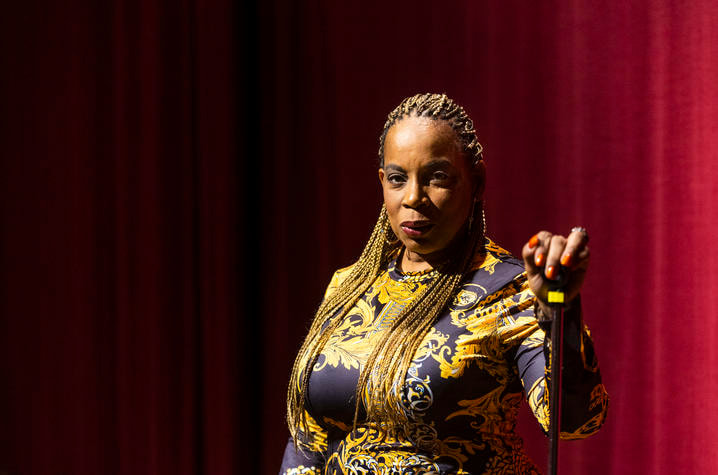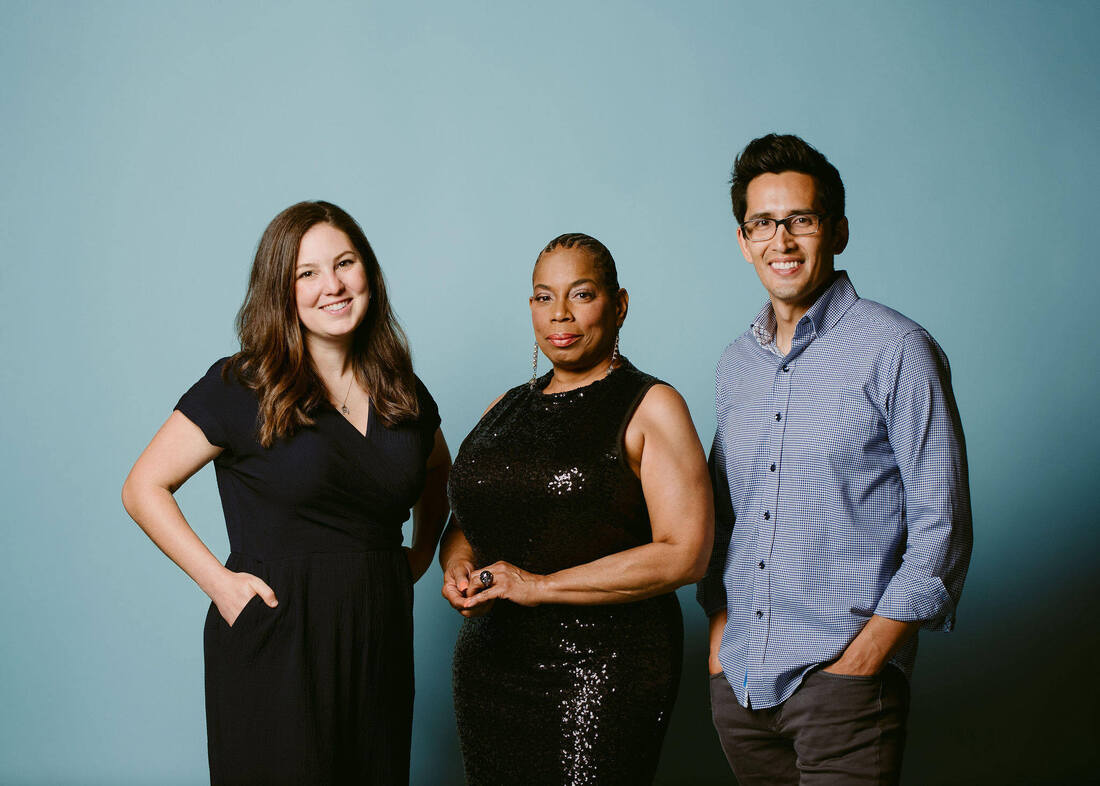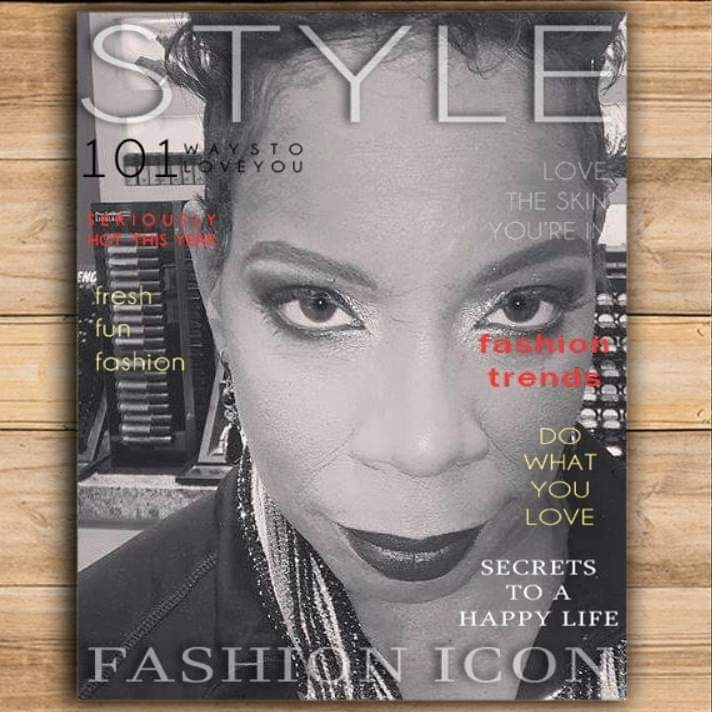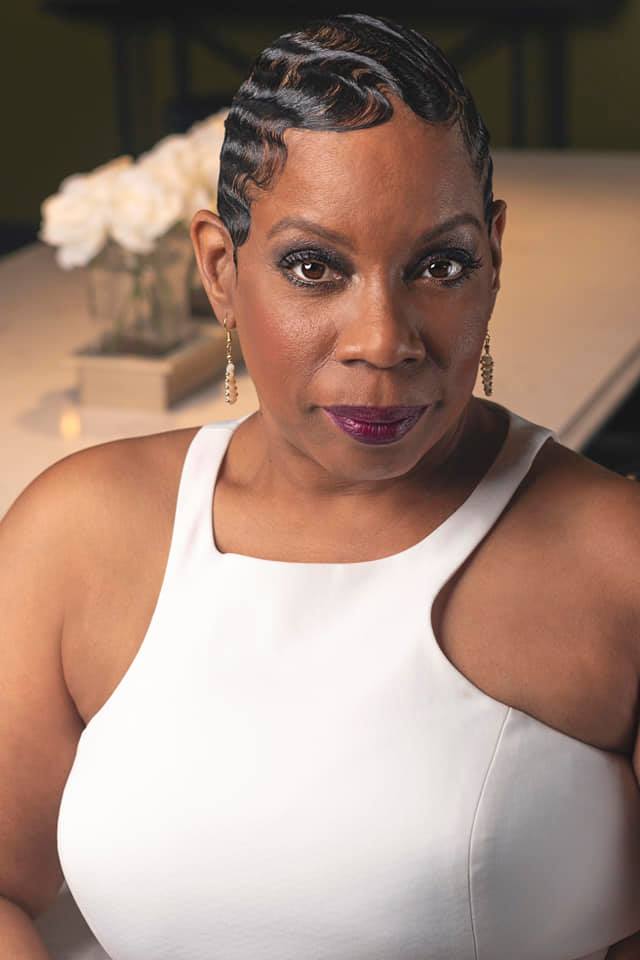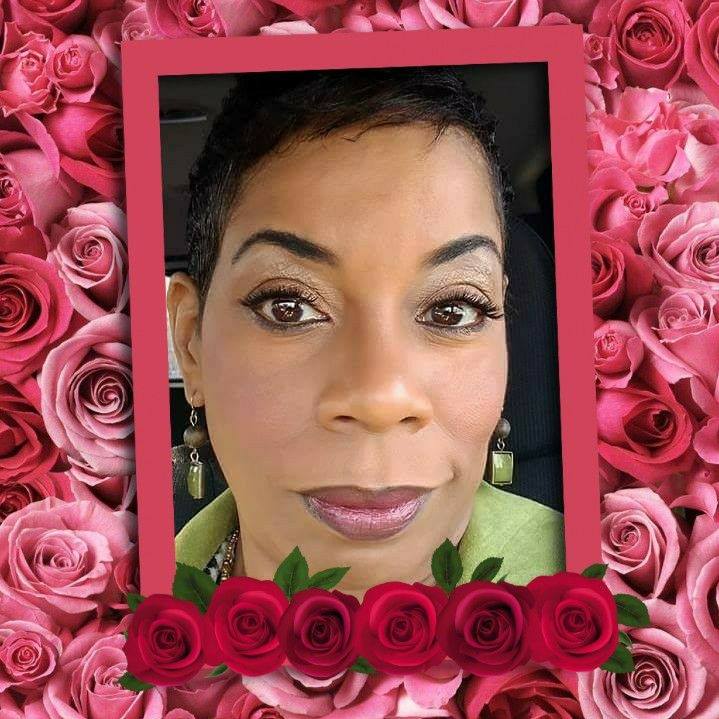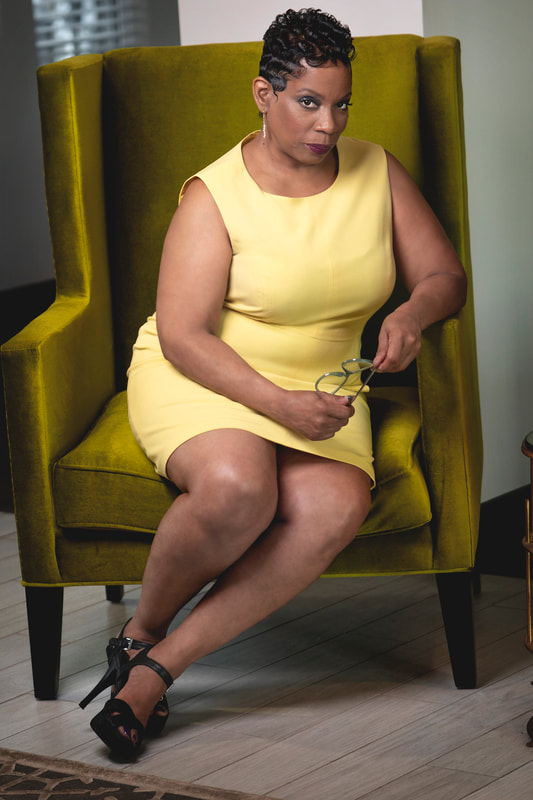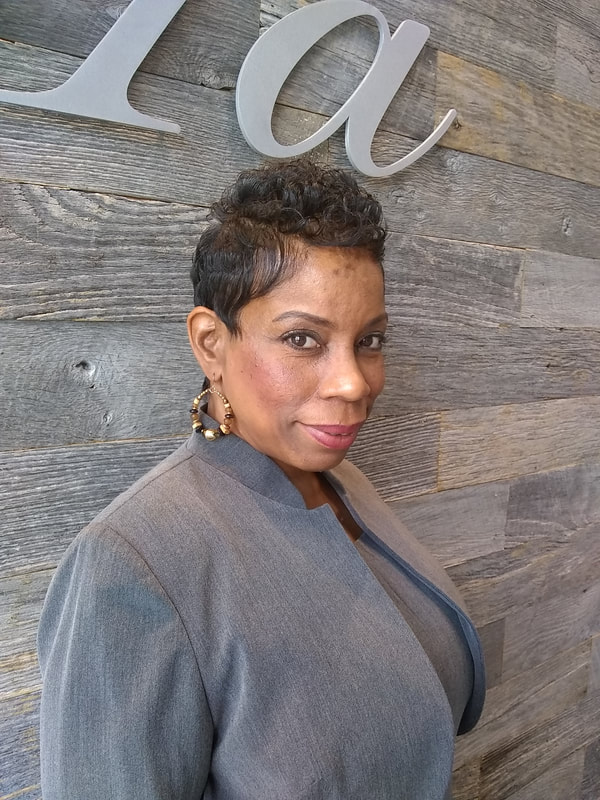debrA F. FAULK ~ EXTRAORDINARY WOMAN
EXTRAORDINARY PEOPLE
If you’re in Debra Faulk’s presence for more than five minutes and haven’t laughed out loud, you might want to get checked out.
The 54-year-old comedienne and performer feels deeply and intently, and she channels her feelings on stage. Especially pain.
“People don’t realize that’s all comedy is, is a bunch of pain,” Debra said. “We try to figure out, ‘How can I make this horrible sickness of a disease into something that’s funny?’ How can I get people to understand that it was my positivity – and my wonderful personality – that got me through this?”
Debra is a breast cancer survivor whose treatment was paused when a drug used to treat her cancer negatively impacted her heart. Familiarity with breast cancer — her sister died from it at 33 — and 16 years of experience as a caregiver for her late father, who had dementia, prepared Debra for the unexpected challenges in her own cancer battle. She anticipated the worst outcome, but wasn’t going to accept it without a fight — or a laugh.
“The thing that kept me going was the fact that I do have a sense of humor,” Debra said. “So even when I wanted to cry, I laughed until I was able to gain an understanding. That’s what I did. I cried and laughed the whole way through.”
“Do things that matter.”
‘I started planning my funeral’In January 2021, Debra went in for her annual mammogram. The year before, she was asked to undergo further ultrasound testing because of a 5-millimeter mass in her right breast. That same ask was made following her 2021 mammogram: the growth had increased to 7 millimeters, prompting the need for a biopsy a month later at the UK Markey Cancer Center. It was determined Debra had Stage 1 breast cancer that was triple-positive, meaning her tumors had estrogen receptors, progesterone receptors and a larger than normal number of HER2 receptors. The HER2 protein promotes the growth of cancer cells.
“When I was told that I had cancer, all I heard was ‘death,’ ” Debra said. “And immediately, I started planning my funeral, because I know a lot of people that didn’t make it.”
Preparing for the worst was something Debra had power over, affording her some stress relief. A self-described “control freak,” she wanted the same ownership of her care. She never stopped asking questions, and when the answers came, she doubled down and asked more. Cancer was a stand-up routine with a bad punchline, and Debra was intent on perfecting it.
She was memorable among the hundreds of patients that Dr. Emily Marcinkowski has treated over the years. A surgical oncologist, Dr. Marcinkowski says many patients are — understandably — stoic or scared when she first meets them. Whatever anxieties Debra had were well-concealed by her readiness for the challenge ahead.
“She wasn’t somebody who waffled back and forth. Here we are, I’m telling a healthy woman that she has breast cancer, and she was just ready to get after it and move on with her life,” said Dr. Marcinkowski. “She was very focused, accepting and determined to move on. She truly had all of the power in her. With breast cancer, there’s this total-loss-of-control element, so whenever a patient can get some of that power back, it’s such a wonderful thing.”
The mass in Debra’s breast was small enough that she could choose between a mastectomy – the removal of the entire breast – or a lumpectomy to remove just the cancer.
“I thought immediately, ‘Just take out what you need! Don’t take all my goods,’” Debra said with a laugh.
Chemotherapy treatment pausedChemotherapy was physically and mentally exhausting for Debra, but her attitude — and her audiences — eased her journey, even when one of her cancer treatments proved problematic.
Herceptin, a cancer therapy drug that targets the aggressive HER2 protein, is among the cancer treatments that can produce side-effects on patients’ hearts. It did so in Debra, forcing her therapies to be paused until a protective measure could be determined and her heart function improved.
The relationship between the UK Markey Cancer Center and UK Gill Heart & Vascular Institute led to establishment of the UK HealthCare cardio-oncology program, which was recently named a Gold Class Center of Excellence by the International Cardio-Oncology Society. It is one of just 27 hospitals in the U.S. with that distinction, and the only one in Kentucky.
If she had to be among the 10 percent of cancer patients who suffer heart damage that can arise from cancer treatment, Debra was in the best place she could be.
Dr. Amit Arbune, UK HealthCare’s director of cardio-oncology, began seeing Debra after a post-chemotherapy echocardiogram revealed a reduction in the “ejection fraction,” or squeezing capacity, in her heart.
“I have to tell most patients, ‘Cancer doesn’t get to stop you from living.’ That was unique with Debra; I didn’t have to convince her.”
There was a time not so long ago when, if adverse effects developed during cancer treatments, doctors had to discontinue that specific therapy and, as a result, reduce a patient’s chances of remission. Cardiologists like Dr. Arbune, who are specialists in treating heart issues in cancer patients, have been game-changers.
“In the past, if patients developed chest pain or coronary spasms related to their chemotherapy, the treatment would be written off,” Dr. Arbune said. “I’ve had a patient who was sent to hospice at a different hospital because she developed cardiovascular side-effects, and she came to Markey for a second opinion. When she was referred to me, we were able to start her on medicine to protect her heart, get her back on chemotherapy, and give her several more years of life.”
That’s what Dr. Arbune was able to do for Debra as well. She resumed her treatments and continued her “normal” life as best she could. Normal, for Debra, means educating others and making them laugh across a variety of stages. Her treatments coincided with a residency as a civic artist for CivicLex and her ongoing role as Nancy Green — the Kentucky woman whose likeness inspired “Aunt Jemima” — for the Kentucky Humanities’ Chautauqua program.
Continuing to do what she loved was never a question for Debra. That made a difference in her recovery.
“The most important thing to Debra was getting to those plays,” Dr. Marcinkowski said. “I have to tell most patients, ‘Cancer doesn’t get to stop you from living.’ That was unique with Debra; I didn’t have to convince her. She was more convincing me. When I was telling her that, she was like, ‘Oh, no doubt. I already knew that. We’re gonna be fine and keep moving.’”
‘Baby, I’m just getting started’Her typical audiences range from schoolchildren to rowdy adults, so Debra’s fellow patients undergoing chemotherapy were quite unique.
As she started to lose her hair, she made the most of it and donned extravagant hats to entertain others as much as herself. She started using Facebook Live to stream her chemotherapy appointments, giving people a window into a process often discussed but rarely seen by those who don’t have to experience it. Like she does through her work, Debra made it her mission to educate – and entertain – those outside and within the room. Her personality wouldn’t allow otherwise.
“There are a lot of different people that come through that waiting room,” Debra said. “And for me to see people sitting there and not conversing, not talking to each other? You can’t act like you don’t see me and we’re both sitting here wrapped up with this tiny little robe on. C’mon, talk to me!
“I think I was able to help some women loosen up and widen their mind to some possibilities. Yeah, we’re sick, but we’re not dead.”
Debra was a vocal advocate for herself during treatment and continues to be one for people going through similar experiences. Because of concerns about scarring, Debra was adamant about not using a PICC line or port. Her treatments were administered through veins in her hand and – at her request – by providers with a long history of using needles.
“Every week, my greatest fear was being stuck with this needle,” Debra said. “But all I kept thinking was, ‘I won’t have any scars.’ You got to find the ‘something’ that gets you through.”
Debra is in remission, and genetic testing determined that her breast cancer was not hereditary, easing another one of her fears
When she was told she had cancer, all Debra heard was ‘death.’ Now all she hears is laughter.
“Baby, I’m just getting started,” Debra said. “Let your light shine. Do things that matter. Chemo helped me love better and harder. I forgive people — I ain’t forgot nothing — but I forgive. And with that same heart that we were able to save at Gill, I can still love and laugh and live.
“That’s what cancer did for me.”
Produced by UK HealthCare Brand Strategy
The 54-year-old comedienne and performer feels deeply and intently, and she channels her feelings on stage. Especially pain.
“People don’t realize that’s all comedy is, is a bunch of pain,” Debra said. “We try to figure out, ‘How can I make this horrible sickness of a disease into something that’s funny?’ How can I get people to understand that it was my positivity – and my wonderful personality – that got me through this?”
Debra is a breast cancer survivor whose treatment was paused when a drug used to treat her cancer negatively impacted her heart. Familiarity with breast cancer — her sister died from it at 33 — and 16 years of experience as a caregiver for her late father, who had dementia, prepared Debra for the unexpected challenges in her own cancer battle. She anticipated the worst outcome, but wasn’t going to accept it without a fight — or a laugh.
“The thing that kept me going was the fact that I do have a sense of humor,” Debra said. “So even when I wanted to cry, I laughed until I was able to gain an understanding. That’s what I did. I cried and laughed the whole way through.”
“Do things that matter.”
‘I started planning my funeral’In January 2021, Debra went in for her annual mammogram. The year before, she was asked to undergo further ultrasound testing because of a 5-millimeter mass in her right breast. That same ask was made following her 2021 mammogram: the growth had increased to 7 millimeters, prompting the need for a biopsy a month later at the UK Markey Cancer Center. It was determined Debra had Stage 1 breast cancer that was triple-positive, meaning her tumors had estrogen receptors, progesterone receptors and a larger than normal number of HER2 receptors. The HER2 protein promotes the growth of cancer cells.
“When I was told that I had cancer, all I heard was ‘death,’ ” Debra said. “And immediately, I started planning my funeral, because I know a lot of people that didn’t make it.”
Preparing for the worst was something Debra had power over, affording her some stress relief. A self-described “control freak,” she wanted the same ownership of her care. She never stopped asking questions, and when the answers came, she doubled down and asked more. Cancer was a stand-up routine with a bad punchline, and Debra was intent on perfecting it.
She was memorable among the hundreds of patients that Dr. Emily Marcinkowski has treated over the years. A surgical oncologist, Dr. Marcinkowski says many patients are — understandably — stoic or scared when she first meets them. Whatever anxieties Debra had were well-concealed by her readiness for the challenge ahead.
“She wasn’t somebody who waffled back and forth. Here we are, I’m telling a healthy woman that she has breast cancer, and she was just ready to get after it and move on with her life,” said Dr. Marcinkowski. “She was very focused, accepting and determined to move on. She truly had all of the power in her. With breast cancer, there’s this total-loss-of-control element, so whenever a patient can get some of that power back, it’s such a wonderful thing.”
The mass in Debra’s breast was small enough that she could choose between a mastectomy – the removal of the entire breast – or a lumpectomy to remove just the cancer.
“I thought immediately, ‘Just take out what you need! Don’t take all my goods,’” Debra said with a laugh.
Chemotherapy treatment pausedChemotherapy was physically and mentally exhausting for Debra, but her attitude — and her audiences — eased her journey, even when one of her cancer treatments proved problematic.
Herceptin, a cancer therapy drug that targets the aggressive HER2 protein, is among the cancer treatments that can produce side-effects on patients’ hearts. It did so in Debra, forcing her therapies to be paused until a protective measure could be determined and her heart function improved.
The relationship between the UK Markey Cancer Center and UK Gill Heart & Vascular Institute led to establishment of the UK HealthCare cardio-oncology program, which was recently named a Gold Class Center of Excellence by the International Cardio-Oncology Society. It is one of just 27 hospitals in the U.S. with that distinction, and the only one in Kentucky.
If she had to be among the 10 percent of cancer patients who suffer heart damage that can arise from cancer treatment, Debra was in the best place she could be.
Dr. Amit Arbune, UK HealthCare’s director of cardio-oncology, began seeing Debra after a post-chemotherapy echocardiogram revealed a reduction in the “ejection fraction,” or squeezing capacity, in her heart.
“I have to tell most patients, ‘Cancer doesn’t get to stop you from living.’ That was unique with Debra; I didn’t have to convince her.”
There was a time not so long ago when, if adverse effects developed during cancer treatments, doctors had to discontinue that specific therapy and, as a result, reduce a patient’s chances of remission. Cardiologists like Dr. Arbune, who are specialists in treating heart issues in cancer patients, have been game-changers.
“In the past, if patients developed chest pain or coronary spasms related to their chemotherapy, the treatment would be written off,” Dr. Arbune said. “I’ve had a patient who was sent to hospice at a different hospital because she developed cardiovascular side-effects, and she came to Markey for a second opinion. When she was referred to me, we were able to start her on medicine to protect her heart, get her back on chemotherapy, and give her several more years of life.”
That’s what Dr. Arbune was able to do for Debra as well. She resumed her treatments and continued her “normal” life as best she could. Normal, for Debra, means educating others and making them laugh across a variety of stages. Her treatments coincided with a residency as a civic artist for CivicLex and her ongoing role as Nancy Green — the Kentucky woman whose likeness inspired “Aunt Jemima” — for the Kentucky Humanities’ Chautauqua program.
Continuing to do what she loved was never a question for Debra. That made a difference in her recovery.
“The most important thing to Debra was getting to those plays,” Dr. Marcinkowski said. “I have to tell most patients, ‘Cancer doesn’t get to stop you from living.’ That was unique with Debra; I didn’t have to convince her. She was more convincing me. When I was telling her that, she was like, ‘Oh, no doubt. I already knew that. We’re gonna be fine and keep moving.’”
‘Baby, I’m just getting started’Her typical audiences range from schoolchildren to rowdy adults, so Debra’s fellow patients undergoing chemotherapy were quite unique.
As she started to lose her hair, she made the most of it and donned extravagant hats to entertain others as much as herself. She started using Facebook Live to stream her chemotherapy appointments, giving people a window into a process often discussed but rarely seen by those who don’t have to experience it. Like she does through her work, Debra made it her mission to educate – and entertain – those outside and within the room. Her personality wouldn’t allow otherwise.
“There are a lot of different people that come through that waiting room,” Debra said. “And for me to see people sitting there and not conversing, not talking to each other? You can’t act like you don’t see me and we’re both sitting here wrapped up with this tiny little robe on. C’mon, talk to me!
“I think I was able to help some women loosen up and widen their mind to some possibilities. Yeah, we’re sick, but we’re not dead.”
Debra was a vocal advocate for herself during treatment and continues to be one for people going through similar experiences. Because of concerns about scarring, Debra was adamant about not using a PICC line or port. Her treatments were administered through veins in her hand and – at her request – by providers with a long history of using needles.
“Every week, my greatest fear was being stuck with this needle,” Debra said. “But all I kept thinking was, ‘I won’t have any scars.’ You got to find the ‘something’ that gets you through.”
Debra is in remission, and genetic testing determined that her breast cancer was not hereditary, easing another one of her fears
When she was told she had cancer, all Debra heard was ‘death.’ Now all she hears is laughter.
“Baby, I’m just getting started,” Debra said. “Let your light shine. Do things that matter. Chemo helped me love better and harder. I forgive people — I ain’t forgot nothing — but I forgive. And with that same heart that we were able to save at Gill, I can still love and laugh and live.
“That’s what cancer did for me.”
Produced by UK HealthCare Brand Strategy
DEBRA FAULK ~ SPREADING HOPE THROUGH HUMOR ~
After her breast cancer diagnosis, Debra Faulk is now using the comedy stage to spread awareness through the perspective of a cancer survivor. Arden Barnes | UK Photo.
LEXINGTON, Ky. (Oct. 28, 2022) -- As a stand-up comedian, Debra Faulk is an expert at transforming the most difficult and uncomfortable moments of her life into something that lifts others.
Active in the local comedy scene, the 54-year-old Lexington native uses standup as a platform to shine a light on serious health issues, with much of her routine inspired by her family’s experiences: one sister dealt with intellectual disabilities while another had breast cancer, her brother served in Desert Storm and came back with PTSD, her father had dementia, and her mother was on dialysis. “This is all under one roof,” she said.
Faulk’s family experience combined with her comedic talent has given her the unique ability to connect with others on topics that can be difficult to talk about.
“Throughout my life I’ve used my experiences as a caretaker, a family member, and a friend of people with health conditions to encourage, inspire and inform others through laughter,” Faulk said.
After her breast cancer diagnosis in 2021, Faulk is now using the stage to spread awareness through the perspective of a cancer survivor.
*****
Faulk spent many years in Los Angeles as a professional stand-up comedian and actor before moving back to Kentucky to continue her theatrical work. In addition to stand-up comedy, she currently serves as one of Lexington’s Civic Artists in Residence and works with Kentucky Humanities portraying Nancy Green, the Kentucky activist, philanthropist and missionary whose likeness became known as “Aunt Jemima.”
Faulk has strong ties to the University of Kentucky: in 2007, she earned a bachelor’s degree in theatre and has served as a guest lecturer and adjunct professor in the College of Fine Arts’ Department of Theatre and Dance.
Faulk’s UK connections now include getting her care at UK HealthCare. In 2021, her annual screening mammogram detected a small mass in her right breast. After a follow-up ultrasound and biopsy at UK Markey Cancer Center, she got the news that it was stage 1 breast cancer.
Faulk says the diagnosis was especially difficult given her family experience with breast cancer. Her grandmother, aunt and sister all had the disease. Her sister passed away at only 33 years old.
“I thought I was going to die. All I kept thinking about was everyone on my mother's side who had breast cancer,” said Faulk. “I figured, ‘I’m on my way out. Let me give everything away to the people that I love.’ And that's what I started doing. I started to pack up my belongings and say goodbye.”
At UK Markey Cancer Center, Faulk met with surgical oncologist Emily Marcinkowski, M.D., who would operate on her and guide her through treatment. Marcinkowski explained that her form of cancer was highly treatable.
Faulk had triple-positive breast cancer, which is driven by hormones progesterone and estrogen and the HER2 protein.
“The HER2 protein promotes growth of cancer cells, which makes her cancer more aggressive,” said Marcinkowski.
“At the same time, it provides a target for treatment so there are very effective therapies. Faulk’s cancer was also caught early, so her prognosis was very good.”
That month, Faulk underwent a lumpectomy, surgery to remove the cancerous tissue from her breast.
After the procedure she was considered cancer free, but would need to have chemotherapy and radiation therapy to reduce the risk of recurrence. Faulk’s treatment care team at Markey included medical oncologist Mara Chambers, M.D., and radiation oncologist Mark Bernard, M.D.
Faulk’s chemotherapy treatments began in April. She received a combination of Taxol and Herceptin, medications that reduce the recurrence of early stage breast cancer. After chemotherapy, she underwent a month of daily radiation therapy treatments, which ended in October.
Herceptin, which targets the HER2 protein, is one of many cancer therapies that can have harmful side effects on the heart. When Faulk began to develop side effects from the medication, she was referred to Amit Arbune, M.D., a cardiologist with UK HealthCare’s Gill Heart & Vascular Institute who specializes in treating cancer-induced heart problems. Faulk took a break from the Herceptin, and Arbune started her on cardioprotective medications that improved her heart function. This allowed her to get back on chemotherapy and complete her full course of treatment without further heart complications. “It was reassuring to have a cardiologist work hand-in-hand with my Markey oncologists to develop a plan to destroy the cancer while saving my heart," Faulk said.
Faulk worked hard to stay strong throughout her treatment course, which was physically and emotionally taxing.
“I didn’t want to tell people I was tired and in pain from the side effects. I just tried to fight through and keep going strong so that I didn’t look sick,” Faulk said. “I just focused on ways I could turn my situation around into something positive for others.” Faulk’s positive energy — and fashion — made her a recognizable presence at Markey throughout the course of her breast cancer treatment. "I made a point of dressing up for all my appointments. I tried to have fun with it,” Faulk said. “When I lost my hair due to chemo, I started to wear extravagant hats. Everyone knew me for them. I had one that was supposed to be worn to a funeral, and I rocked it. I bedazzled it all out.”
Faulk also had a way of connecting with other patients in the waiting room and her care team in the clinic.
“I just saw other people who needed to be lifted up,” Faulk said. “We’d start talking about something other than why we were there. I’d tell a joke or a story to get their minds off a difficult situation, even if it was just for a moment.’”
*****
Faulk had more positive news during her course of treatment. Genetic testing showed that she did not have BRCA gene mutations, which raise the risk of getting cancer again. The results also meant that her cancer was not hereditary, even though three close relatives had breast cancer.
“I’ve been trying to make sense of it all. Maybe it was to make my comedy better, maybe it was to help make me more believable. Maybe it was to help me be more compassionate,” Faulk said. “I think what it comes down to is that I had to fight a real fight so I could understand people on a different level. And now I get to live to tell the story.”
Faulk now plans to use her story to spread awareness about the importance of annual mammograms, particularly among Black women, who are 40% more likely to die from breast cancer than white women, even though the incidence rate is about the same. This likely reflects the fact that fewer cancers are diagnosed at an early stage, due to factors including less access to and higher levels of mistrust toward health care.
“I saw it happen with my own family and many other women within our community,” she said. “Getting screened saved my life. I hope my own experience can draw awareness to the importance of getting your mammogram every year and that there are resources available to help.” She also plans to offer support to other patients and survivors through comedy. “Patients need to know that they are their own best advocates,” Faulk said. “They need to make certain their voices are heard. At the same time, it’s ok to ask for help. Take advantage of all the services available to you.”
Ultimately, she hopes that sharing her experiences can help others in a similar place find the light in dark situations.
“I hope for survivors, my story inspires them to take difficult situations and turn them around into something that can do good,” she said. “I’m glad I found out in time to save myself, so that’s what I plan to do.”
The University of Kentucky is increasingly the first choice for students, faculty and staff to pursue their passions and their professional goals. In the last two years, Forbes has named UK among the best employers for diversity, and INSIGHT into Diversity recognized us as a Diversity Champion four years running. UK is ranked among the top 30 campuses in the nation for LGBTQ* inclusion and safety. UK has been judged a “Great College to Work for" three years in a row, and UK is among only 22 universities in the country on Forbes' list of "America's Best Employers." We are ranked among the top 10 percent of public institutions for research expenditures — a tangible symbol of our breadth and depth as a university focused on discovery that changes lives and communities. And our patients know and appreciate the fact that UK HealthCare has been named the state’s top hospital for five straight years. Accolades and honors are great. But they are more important for what they represent: the idea that creating a community of belonging and commitment to excellence is how we honor our mission to be not simply the University of Kentucky, but the University for Kentucky.
LEXINGTON, Ky. (Oct. 28, 2022) -- As a stand-up comedian, Debra Faulk is an expert at transforming the most difficult and uncomfortable moments of her life into something that lifts others.
Active in the local comedy scene, the 54-year-old Lexington native uses standup as a platform to shine a light on serious health issues, with much of her routine inspired by her family’s experiences: one sister dealt with intellectual disabilities while another had breast cancer, her brother served in Desert Storm and came back with PTSD, her father had dementia, and her mother was on dialysis. “This is all under one roof,” she said.
Faulk’s family experience combined with her comedic talent has given her the unique ability to connect with others on topics that can be difficult to talk about.
“Throughout my life I’ve used my experiences as a caretaker, a family member, and a friend of people with health conditions to encourage, inspire and inform others through laughter,” Faulk said.
After her breast cancer diagnosis in 2021, Faulk is now using the stage to spread awareness through the perspective of a cancer survivor.
*****
Faulk spent many years in Los Angeles as a professional stand-up comedian and actor before moving back to Kentucky to continue her theatrical work. In addition to stand-up comedy, she currently serves as one of Lexington’s Civic Artists in Residence and works with Kentucky Humanities portraying Nancy Green, the Kentucky activist, philanthropist and missionary whose likeness became known as “Aunt Jemima.”
Faulk has strong ties to the University of Kentucky: in 2007, she earned a bachelor’s degree in theatre and has served as a guest lecturer and adjunct professor in the College of Fine Arts’ Department of Theatre and Dance.
Faulk’s UK connections now include getting her care at UK HealthCare. In 2021, her annual screening mammogram detected a small mass in her right breast. After a follow-up ultrasound and biopsy at UK Markey Cancer Center, she got the news that it was stage 1 breast cancer.
Faulk says the diagnosis was especially difficult given her family experience with breast cancer. Her grandmother, aunt and sister all had the disease. Her sister passed away at only 33 years old.
“I thought I was going to die. All I kept thinking about was everyone on my mother's side who had breast cancer,” said Faulk. “I figured, ‘I’m on my way out. Let me give everything away to the people that I love.’ And that's what I started doing. I started to pack up my belongings and say goodbye.”
At UK Markey Cancer Center, Faulk met with surgical oncologist Emily Marcinkowski, M.D., who would operate on her and guide her through treatment. Marcinkowski explained that her form of cancer was highly treatable.
Faulk had triple-positive breast cancer, which is driven by hormones progesterone and estrogen and the HER2 protein.
“The HER2 protein promotes growth of cancer cells, which makes her cancer more aggressive,” said Marcinkowski.
“At the same time, it provides a target for treatment so there are very effective therapies. Faulk’s cancer was also caught early, so her prognosis was very good.”
That month, Faulk underwent a lumpectomy, surgery to remove the cancerous tissue from her breast.
After the procedure she was considered cancer free, but would need to have chemotherapy and radiation therapy to reduce the risk of recurrence. Faulk’s treatment care team at Markey included medical oncologist Mara Chambers, M.D., and radiation oncologist Mark Bernard, M.D.
Faulk’s chemotherapy treatments began in April. She received a combination of Taxol and Herceptin, medications that reduce the recurrence of early stage breast cancer. After chemotherapy, she underwent a month of daily radiation therapy treatments, which ended in October.
Herceptin, which targets the HER2 protein, is one of many cancer therapies that can have harmful side effects on the heart. When Faulk began to develop side effects from the medication, she was referred to Amit Arbune, M.D., a cardiologist with UK HealthCare’s Gill Heart & Vascular Institute who specializes in treating cancer-induced heart problems. Faulk took a break from the Herceptin, and Arbune started her on cardioprotective medications that improved her heart function. This allowed her to get back on chemotherapy and complete her full course of treatment without further heart complications. “It was reassuring to have a cardiologist work hand-in-hand with my Markey oncologists to develop a plan to destroy the cancer while saving my heart," Faulk said.
Faulk worked hard to stay strong throughout her treatment course, which was physically and emotionally taxing.
“I didn’t want to tell people I was tired and in pain from the side effects. I just tried to fight through and keep going strong so that I didn’t look sick,” Faulk said. “I just focused on ways I could turn my situation around into something positive for others.” Faulk’s positive energy — and fashion — made her a recognizable presence at Markey throughout the course of her breast cancer treatment. "I made a point of dressing up for all my appointments. I tried to have fun with it,” Faulk said. “When I lost my hair due to chemo, I started to wear extravagant hats. Everyone knew me for them. I had one that was supposed to be worn to a funeral, and I rocked it. I bedazzled it all out.”
Faulk also had a way of connecting with other patients in the waiting room and her care team in the clinic.
“I just saw other people who needed to be lifted up,” Faulk said. “We’d start talking about something other than why we were there. I’d tell a joke or a story to get their minds off a difficult situation, even if it was just for a moment.’”
*****
Faulk had more positive news during her course of treatment. Genetic testing showed that she did not have BRCA gene mutations, which raise the risk of getting cancer again. The results also meant that her cancer was not hereditary, even though three close relatives had breast cancer.
“I’ve been trying to make sense of it all. Maybe it was to make my comedy better, maybe it was to help make me more believable. Maybe it was to help me be more compassionate,” Faulk said. “I think what it comes down to is that I had to fight a real fight so I could understand people on a different level. And now I get to live to tell the story.”
Faulk now plans to use her story to spread awareness about the importance of annual mammograms, particularly among Black women, who are 40% more likely to die from breast cancer than white women, even though the incidence rate is about the same. This likely reflects the fact that fewer cancers are diagnosed at an early stage, due to factors including less access to and higher levels of mistrust toward health care.
“I saw it happen with my own family and many other women within our community,” she said. “Getting screened saved my life. I hope my own experience can draw awareness to the importance of getting your mammogram every year and that there are resources available to help.” She also plans to offer support to other patients and survivors through comedy. “Patients need to know that they are their own best advocates,” Faulk said. “They need to make certain their voices are heard. At the same time, it’s ok to ask for help. Take advantage of all the services available to you.”
Ultimately, she hopes that sharing her experiences can help others in a similar place find the light in dark situations.
“I hope for survivors, my story inspires them to take difficult situations and turn them around into something that can do good,” she said. “I’m glad I found out in time to save myself, so that’s what I plan to do.”
The University of Kentucky is increasingly the first choice for students, faculty and staff to pursue their passions and their professional goals. In the last two years, Forbes has named UK among the best employers for diversity, and INSIGHT into Diversity recognized us as a Diversity Champion four years running. UK is ranked among the top 30 campuses in the nation for LGBTQ* inclusion and safety. UK has been judged a “Great College to Work for" three years in a row, and UK is among only 22 universities in the country on Forbes' list of "America's Best Employers." We are ranked among the top 10 percent of public institutions for research expenditures — a tangible symbol of our breadth and depth as a university focused on discovery that changes lives and communities. And our patients know and appreciate the fact that UK HealthCare has been named the state’s top hospital for five straight years. Accolades and honors are great. But they are more important for what they represent: the idea that creating a community of belonging and commitment to excellence is how we honor our mission to be not simply the University of Kentucky, but the University for Kentucky.
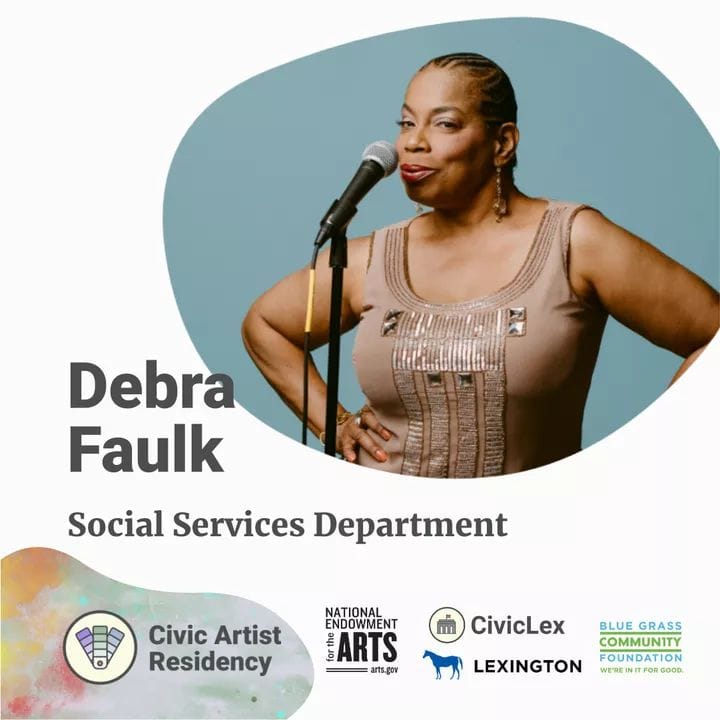
Government invites artists into city offices
Tuesday, June 15, 2021 By Susan Straub
Three local artists are now working inside Lexington city offices to help government employees explore new ways to engage residents and develop creative new projects.
“The artists are here! I couldn’t be more excited about the opportunities that creates for our community and our employees,” Mayor Linda Gorton said.
CivicLex, Blue Grass Community Foundation and the City are working together to create a “Civic Artist-in-Residence” program.
“At CivicLex, we know that creative thinking can help us find new ways of bringing together residents and city government,” said Richard Young, Executive Director of CivicLex. “Reinforcing trust in Democracy must be rooted in building relationships, and we are so excited that LFUCG has seen the potential for this program to do just that.”
Although this program is new to Lexington and a first for Kentucky, civic artist-in-residence programs are a nationally recognized model for developing new approaches to transforming city government. The program is funded, in part, by a federal Our Town grant from the National Endowment for the Arts.
Blue Grass Community Foundation is excited to partner in this endeavor. Grants from the National Endowment for the Arts are highly competitive, so receiving this award in Lexington is a testament to the innovative and important work of CivicLex the vibrancy of our arts community, and the openness of city government to look at creative, fresh approaches to the delivery of services to residents,” said Lisa Adkins, Foundation President and CEO.
The program was developed over the past 18 months by a 26-member Advisory Committee that included city employees and community members. The Advisory Committee solicited applications from Fayette County-based artists and selected three finalists who will work in the Environmental Quality and Public Works, Social Services, and Finance departments.
The three artists selected, from 56 applicants, include:
Debra F. Faulk – Faulk, a native of Lexington, spent many years in Los Angeles as a stand-up comedienne and actress before she returned to Lexington to continue her theatrical work. She has been a guest lecturer and adjunct professor with the University of Kentucky Department of Theatre and Dance and with the Theatre Of Hearts/Youth First in Los Angeles Faulk currently works with Kentucky Humanities portraying NANCY GREEN "Being Aunt Jemima-The Pancake Queen" - Kentucky Chautauqua the Kentucky activist, philanthropist and missionary, whose likeness became known as “Aunt Jemima.” Debra will be working with the UK Pediatrics - Family Care Center within the Department of Social Services.
Anthony Gilmore – Gilmore is a film producer and director whose work includes the documentary film, “Behind Forgotten Eyes.” It was named best documentary film at numerous film festivals including the Melbourne (Australia) Independent Film Festival, among others. Other films include “The Lion,” which focuses on a renowned Japanese Kabuki performer and “Play Money,” a dramatic feature film. Originally from Nebraska, Gilmore lived in Korea and Japan for numerous years, founded and directed the Nameless Theatre in Japan, and moved to Lexington with his family three years ago. Gilmore will be working with the Environmental Quality and Public Works Department,
Hannah Allen – Hannah Allen is a quilter and fiber artist living in Lexington, Kentucky. Having grown up in the Lexington art community as a visual art student at SCAPA, Hannah experienced a variety of mediums from a young age, discovering a love of sewing and textile arts. After a long hiatus from art, instead of studying and working in architectural history, she re-discovered her love of sewing in 2018. In 2019, she was a part of the Rita’s Quilt project, contributing the embroidered Kentucky square. The quilt was displayed at the National Quilt Museum in Paducah, KY in March 2020, and was featured on NPR, BBC, and Atlas Obscura. Her current work expresses the comfort of a handmade quilt, the joy of creative freedom, and the unexpected happiness in rediscovering past interests. Allen will be working with the Finance Department.
Tuesday, June 15, 2021 By Susan Straub
Three local artists are now working inside Lexington city offices to help government employees explore new ways to engage residents and develop creative new projects.
“The artists are here! I couldn’t be more excited about the opportunities that creates for our community and our employees,” Mayor Linda Gorton said.
CivicLex, Blue Grass Community Foundation and the City are working together to create a “Civic Artist-in-Residence” program.
“At CivicLex, we know that creative thinking can help us find new ways of bringing together residents and city government,” said Richard Young, Executive Director of CivicLex. “Reinforcing trust in Democracy must be rooted in building relationships, and we are so excited that LFUCG has seen the potential for this program to do just that.”
Although this program is new to Lexington and a first for Kentucky, civic artist-in-residence programs are a nationally recognized model for developing new approaches to transforming city government. The program is funded, in part, by a federal Our Town grant from the National Endowment for the Arts.
Blue Grass Community Foundation is excited to partner in this endeavor. Grants from the National Endowment for the Arts are highly competitive, so receiving this award in Lexington is a testament to the innovative and important work of CivicLex the vibrancy of our arts community, and the openness of city government to look at creative, fresh approaches to the delivery of services to residents,” said Lisa Adkins, Foundation President and CEO.
The program was developed over the past 18 months by a 26-member Advisory Committee that included city employees and community members. The Advisory Committee solicited applications from Fayette County-based artists and selected three finalists who will work in the Environmental Quality and Public Works, Social Services, and Finance departments.
The three artists selected, from 56 applicants, include:
Debra F. Faulk – Faulk, a native of Lexington, spent many years in Los Angeles as a stand-up comedienne and actress before she returned to Lexington to continue her theatrical work. She has been a guest lecturer and adjunct professor with the University of Kentucky Department of Theatre and Dance and with the Theatre Of Hearts/Youth First in Los Angeles Faulk currently works with Kentucky Humanities portraying NANCY GREEN "Being Aunt Jemima-The Pancake Queen" - Kentucky Chautauqua the Kentucky activist, philanthropist and missionary, whose likeness became known as “Aunt Jemima.” Debra will be working with the UK Pediatrics - Family Care Center within the Department of Social Services.
Anthony Gilmore – Gilmore is a film producer and director whose work includes the documentary film, “Behind Forgotten Eyes.” It was named best documentary film at numerous film festivals including the Melbourne (Australia) Independent Film Festival, among others. Other films include “The Lion,” which focuses on a renowned Japanese Kabuki performer and “Play Money,” a dramatic feature film. Originally from Nebraska, Gilmore lived in Korea and Japan for numerous years, founded and directed the Nameless Theatre in Japan, and moved to Lexington with his family three years ago. Gilmore will be working with the Environmental Quality and Public Works Department,
Hannah Allen – Hannah Allen is a quilter and fiber artist living in Lexington, Kentucky. Having grown up in the Lexington art community as a visual art student at SCAPA, Hannah experienced a variety of mediums from a young age, discovering a love of sewing and textile arts. After a long hiatus from art, instead of studying and working in architectural history, she re-discovered her love of sewing in 2018. In 2019, she was a part of the Rita’s Quilt project, contributing the embroidered Kentucky square. The quilt was displayed at the National Quilt Museum in Paducah, KY in March 2020, and was featured on NPR, BBC, and Atlas Obscura. Her current work expresses the comfort of a handmade quilt, the joy of creative freedom, and the unexpected happiness in rediscovering past interests. Allen will be working with the Finance Department.
A mag created with Madmagz.
16* march * 2021 *
* HAPPY * birthday * debra
Click to set custom HTML
Click to set custom HTML
